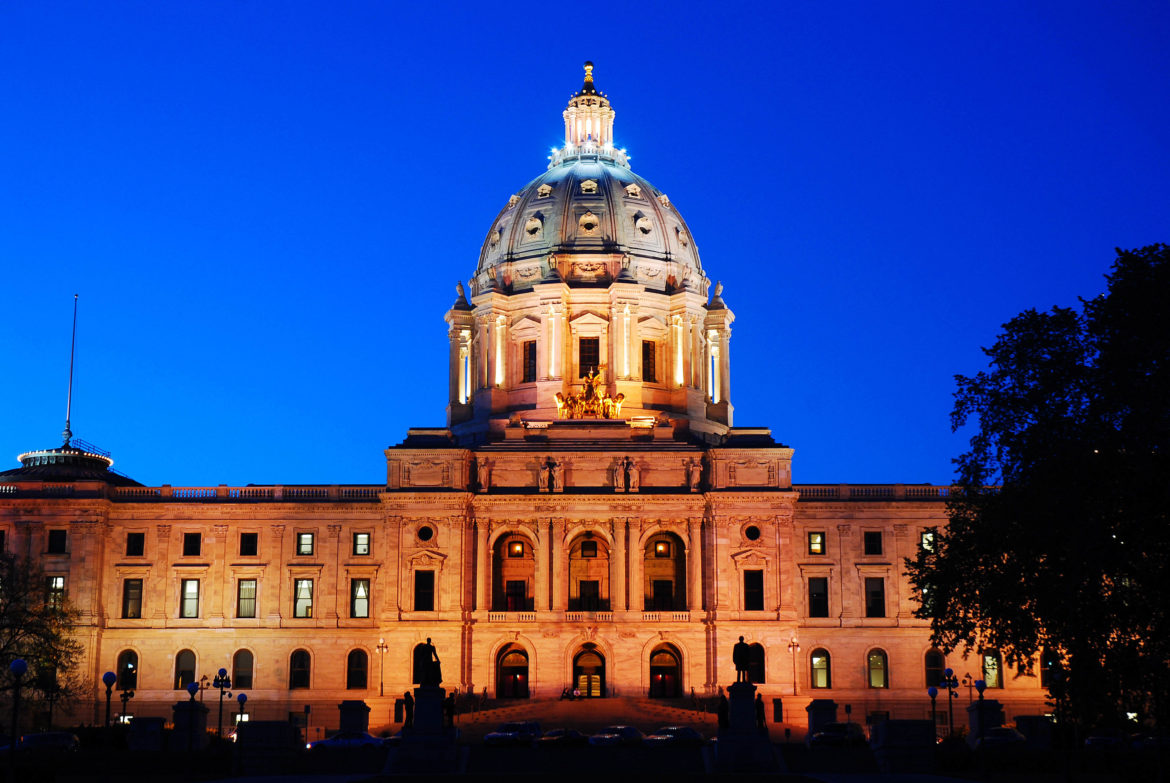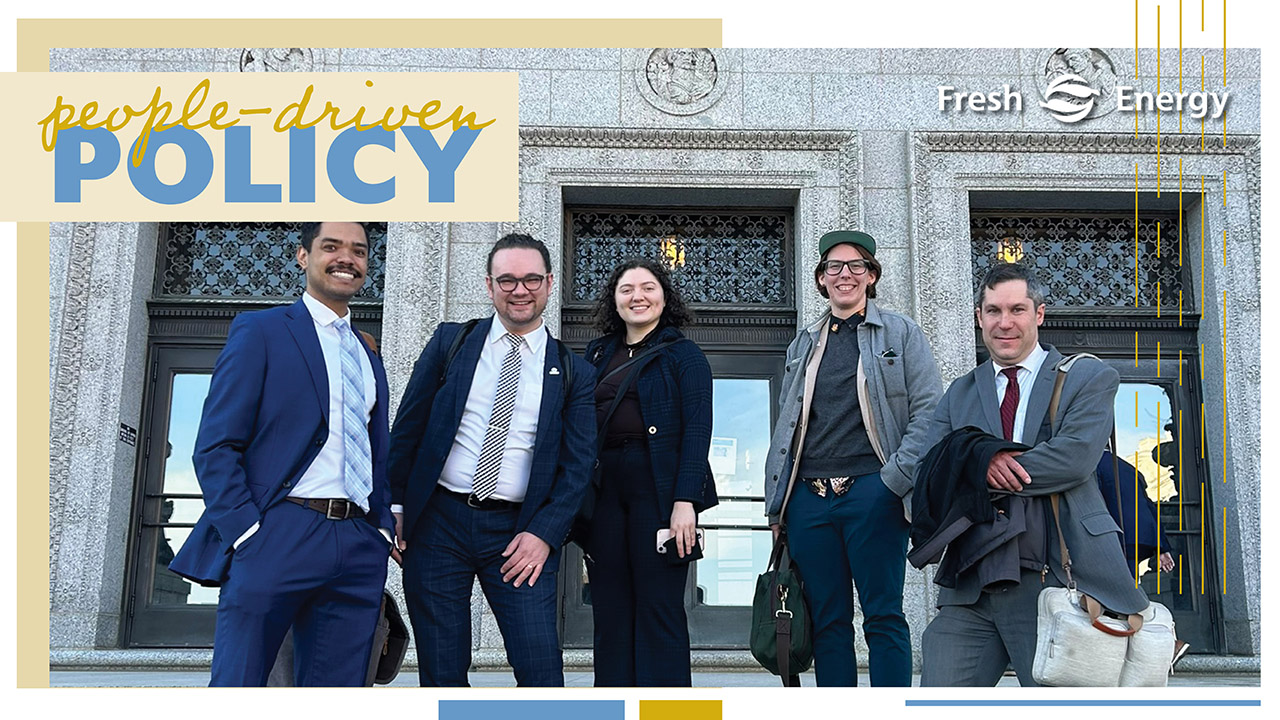
This year marks the ten year anniversary of the historic, bipartisan Next Generation Energy Act. Passed with broad bipartisan support and signed into law by Governor Tim Pawlenty, the 2007 law made Minnesota a national leader on energy and led to the creation of thousands of good paying jobs across the state. Unfortunately, that same bipartisan commitment to clean energy was absent in the Legislature this session. Not only did the Legislature not help Minnesota make any energy progress, it rolled back a few pieces of past progress Minnesota leaders worked so hard to achieve together, and did so in a way that will unfairly harm energy consumers in Greater Minnesota.
The Conference Committee Reports released in the final hours of the session still contained several bad policy provisions from earlier House and Senate bills. Fresh Energy is thankful that Governor Mark Dayton was able to have nearly all of the bad energy policy removed as part of a universal agreement on the state budget.
Unfortunately, some bad energy policy was included in the final agreement:
- Removal of consumer protections for families, businesses, and farmers served by municipal and cooperative utilities — customers who invest in their own energy facilities like rooftop solar and small wind. Right now, cooperative customers are challenging fees as high as $83 per month at the Minnesota Public Utilities Commission. This bill will remove their ability to have those fees reviewed by independent experts at the Commission. This language was vetoed twice – as a stand-alone bill and again in the first Jobs and Energy Omnibus Bill, but was unfortunately included in the final agreement.
- Exemption of small utilities (cooperatives with fewer than 5,000 customers and municipals with fewer than 1,000 customers) from the state’s Conservation Improvement Program. In total, at least 12 cooperative and 38 municipal utilities will now be left out, leaving more than 62,000 rural customers without the same opportunities to cut energy waste and save money on their utility bills. Fresh Energy is committed to working with both cooperatives and municipal utilities to make improvements to the Conservation Improvement Program now and moving forward, but picking and choosing cooperatives and municipals at a certain customer size ignores the reality of how different utilities perform year to year. Some small utilities work with others to easily meet Conservation Improvement Program goals. Some larger utilities go it alone and could have a hard time. Customer size does not determine how a utility may perform in conserving energy.
- Creation of a goal for rate-making decisions at the Public Utilities Commission to place Minnesota rates below the national average. While we are strongly in favor of more cost-effective energy resources, this new law reduces energy costs down to one single metric – rates. In reality, the amount you pay on your energy bill is affected by many factors including the rate you pay per kilowatt hour but also how many kilowatt hours you use, whether you are incentivized to use energy at certain times of the day at lower costs, and others. Minnesota’s current holistic approach of analyzing rate increases and energy costs has helped keep Minnesota’s energy bills much lower than our neighboring states.
- Fees on electric vehicles. Electric vehicle owners will now be assessed a tax of $75 a year. A recent analysis shows that electric vehicles already pay their fair share. Electric vehicles also provide a much more direct economic benefit by refueling with predictable priced energy from local electric utilities rather than with imported fuels. By creating greater demand for local energy like wind and solar that’s owned by Minnesota companies, electric vehicles spur business growth while reducing emissions in our communities. There’s no reason to discourage that kind of progress with an unfair penalty for families and businesses. (For clarity: the fee will not be charged on cars that use both electricity and gas, such as a Chevy Volt – only on fully electric vehicles)
- The Legislature will now have the ability to interfere with projects funded out of the Renewable Development Account, which currently pays for clean energy innovation projects. Though Xcel Energy and the Public Utilities Commission has authority over which projects are recommended for funding each year, the Legislature can then zero out funding for that slate of projects.
Despite these bad policies becoming law, it actually could have been much worse. Thanks to the work of Fresh Energy and our partners, the following bad energy provisions were removed from the final budget deal:
- The Volkswagen Clean Air Act Settlement funds would have had to be restricted to allocations first approved by the legislature. Minnesota is due up to $47 million as part of Volkswagen ’s legal settlement over its violation of emissions standards for their diesel cars. Because those funds will be distributed through a court-mandated trustee, limiting disbursement in state statute would have put those funds at risk.
- Minnesota’s nation-leading building energy code would have been crippled by requiring technical review and rulemaking to be done at the State Capitol. This would have led to substandard, inefficient homes being built, with families and businesses on the hook to deal with costly repairs and expensive monthly bills.
- The Public Utilities Commission would have been required to skew resource planning decisions in favor of job retention. While job creation and impacts on the economy are already considered during the review of Integrated Resource Plans at the Public Utilities Commission, this language would have tilted the scales in favor of job retention at existing power plants at the expense of other factors. While this may have had short-term benefits for certain communities, it would have limited the ability for utilities to diversify their energy investments and grow energy jobs statewide while keeping electric bills affordable.
- Members of the Public Utilities Commission would have been appointed by leaders of each of the four political caucuses as well as the Governor, and recent Dayton appointees would have been removed before their current term was scheduled to end. The Public Utilities Commission plays a critical role in providing economic, technical, and judicial review of Minnesota’s energy sector. This language would have made the appointment process for those commissioners completely political. The current system already allows lawmakers to provide input during confirmation hearings in the Senate (as they did when confirming Public Utilities Commissioner Katie Sieben this session).
Fresh Energy was watching a number of other bills:
- Indefinite suspension of residential Property Assessed Clean Energy (PACE) loans in Minnesota that could finance energy efficiency and renewable energy projects for single-family homes. This bill establishes a stakeholder process to assess and develop changes to residential PACE programs for recommendation to the Minnesota Legislature. Recognizing consumer protection concerns supporting this bill, Fresh Energy gathered broad public support for the position that a temporary suspension of residential PACE loans for the duration of the stakeholder process would have been a more balanced approach.
- Allowing for an additional community solar compliance option under the Solar Energy Standard small system requirement and clarifying resource planning language for Minnesota Power and Otter Tail Power only. Recognizing the concerns of Minnesota Power and Otter Tail Power customers interested in rooftop solar, Fresh Energy will continue to push for rooftop solar options as utility compliance plans go to the Minnesota Public Utilities Commission.
Over the past decade, Minnesota has become a national leader in creating good paying clean energy jobs that have transformed our energy sector and enriched the state’s economy. Unfortunately, lawmakers rolled back several pieces of that progress this session in a way that hurts solar, wind, and energy efficiency consumers, especially customers in Greater Minnesota.
If you have any questions about legislation passed this year or want to get involved in energy work at the Capitol, please email our team.

